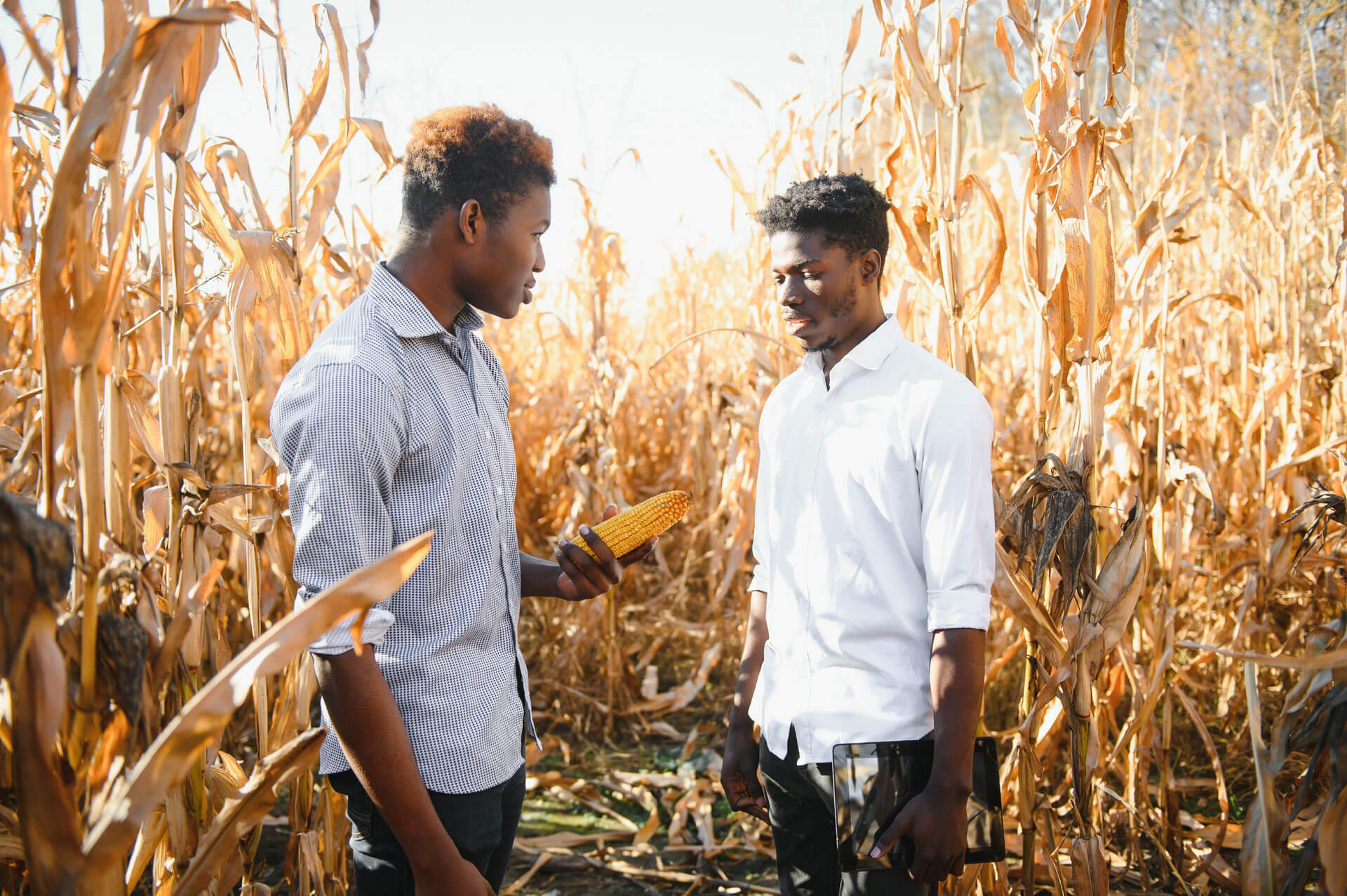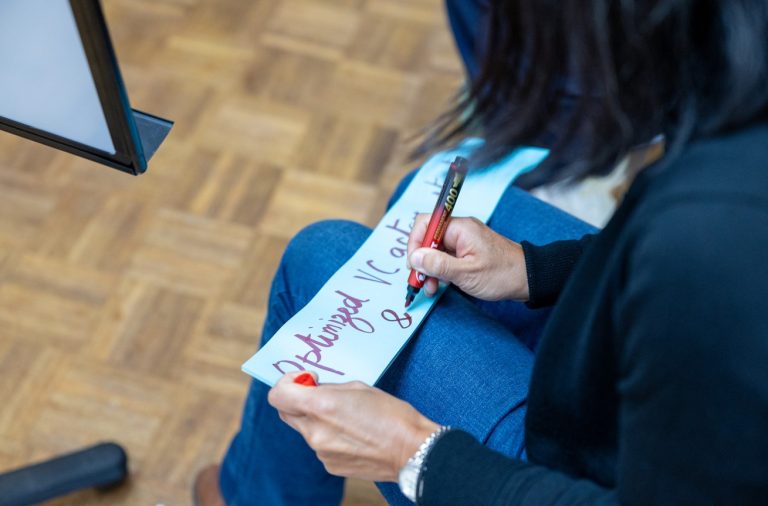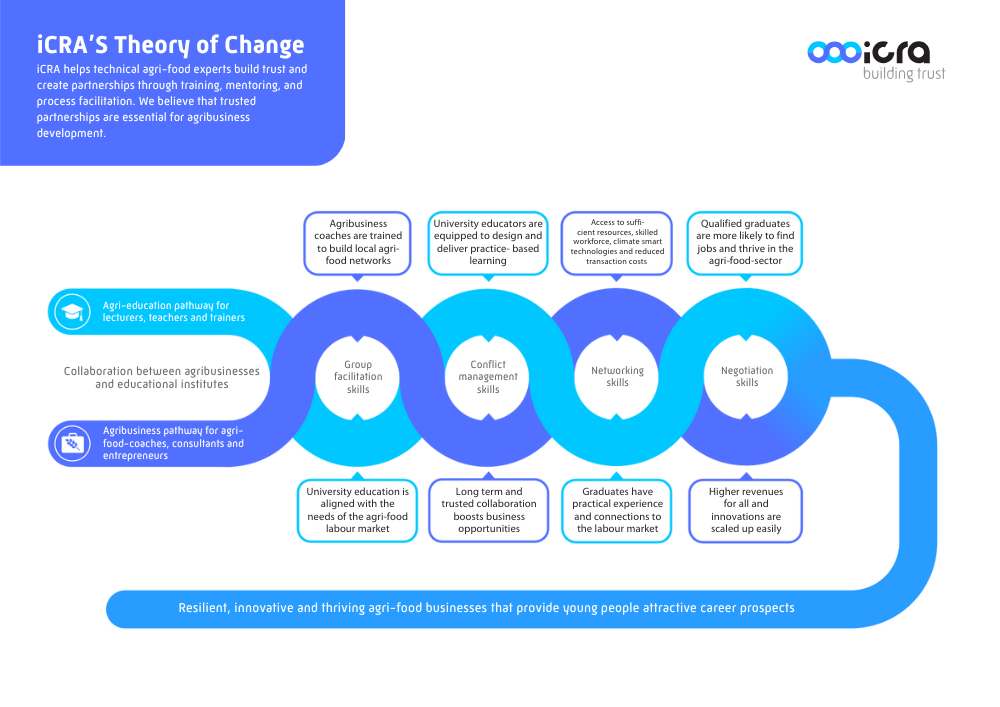
Creating a bigger pie for all
Competitive clusters
We build local, commodity-specific networks of agri-food actors called clusters. Agribusinesses taking part in such strong partnerships (clusters) are more competitive and resilient. Creating a bigger pie for all, not just bigger slices for some.
Training trainers
Partnerships aren't built automatically. Cluster coaches facilitate partnerships and guide their maturation to independence. Regional agribusiness trainers support coaches. This training-of-trainers model keeps agency in the hands of local professionals. It also scales-up our impact.
Guiding negotiation
Loyalty between farmers and buyers is difficult to build and maintain. Written contracts are no guarantee. Our agribusiness trainers guide agribusinesses in negotiating, contracting and overcoming conflict. They kick-start partnerships based on mutual trust.
Lasting partnerships
iCRA consolidates partnerships before project funding ends. We help agribusiness networks assess their relevance, mature and ensure business viability. This encourages more stakeholders to join which scales the cluster and promotes lasting impact.

Preparing the next generation of agri-food professionals
Partnering with private sector
Skilled graduates are the future. Education should teach the skills the labor market needs. Providers must align with the private sector to foster long lasting, pragmatic relationships.
Learning by doing
Learning should be useful and joyful. Students need practical skills to kick-start their careers. We train educators to use innovative, student-centered approaches to learning and nurture their confidence and soft skills.
Rethinking curricula
How can your curriculum reflect the complex needs of the private sector? We assess existing content and support redesign to build a responsive program that prepares students for the realities of work.
Future focus
We help teachers, universities and vocational trainers to improve the connection between the classroom and the world of work. We support them to create strong alumni networks for mentoring and internships.
We play six roles
Trainer
We are experts in learning. Our experienced trainers bring both creativity and fun into classrooms! We provide practical training designed according to proven learning models. At the end of an iCRA training participants are ready to implement new skills.
Partnership builder
We build partnerships based on trust – a key ingredient often missing from food systems. From managing conflicting interests to negotiating contracts, when iCRA facilitates a collaboration, we create partnerships that lead to action.
Networker
Our global network of experts means boots are on the ground wherever we work. We have strong ties with alumni and in-country partners. Our community creates opportunities to learn from one another. It also enables iCRA's impact to grow beyond our small size.
Process facilitator
Our workshops bring together whole agri-food systems and kick-start collective strategic planning. We find common ground, give everyone a voice and establish commitment with everyone on board.
Coach
We encourage agri-food professionals and partner organisations to think creatively and innovate. Through mentoring, we give trainees confidence to implement new skills and find partners.
Project manager
Projects in partnership with iCRA run smoothly. We are pragmatic, flexible and expert in collaboration. Our community tailors our interventions to implementation contexts and scales our impact.



“The most common responses to our question 'What did you get from iCRA?' were 'vision' and 'confidence'.”
Partnerships are essential to agribusiness development
Climate change, conflict and urbanisation challenge food security. Young people see few attractive opportunities in the agricultural sector. But the food system is changing. Smallholders and entrepreneurs are leading the way towards a more productive, commercialised sector. These growing agribusiness can provide off-farm opportunities but lack practically skilled young people.
By strengthening relationships in agri-food networks iCRA supports this momentum. Agribusiness partnerships reduce agribusiness’ costs and risks, increasing opportunities and resilience. Close ties between the private sector and agri-education institutes give young people the opportunity to learn practical skills. This translates to motivated, employable young agri-food professionals.
iCRA builds trust in the agricultural sector through partnership facilitation and training. We empower the people who create change in their community. Our mission? To build resilient, innovative and sustainable food systems that offers attractive career opportunities for young people. Our work contributes to realizing Sustainable Development Goal two ‘Zero Hunger’.
We bring soft skills to the table
Technical interventions alone don’t result in impactful projects. Collaboration makes food systems more efficient, innovative and resilient. iCRA brings soft skills to the table. Trust and partnerships between agri-food stakeholders act as catalysts to implement technical interventions at scale. iCRA equips agribusinesses and agri-education professionals with the skills to build sustainable partnerships.
”)

